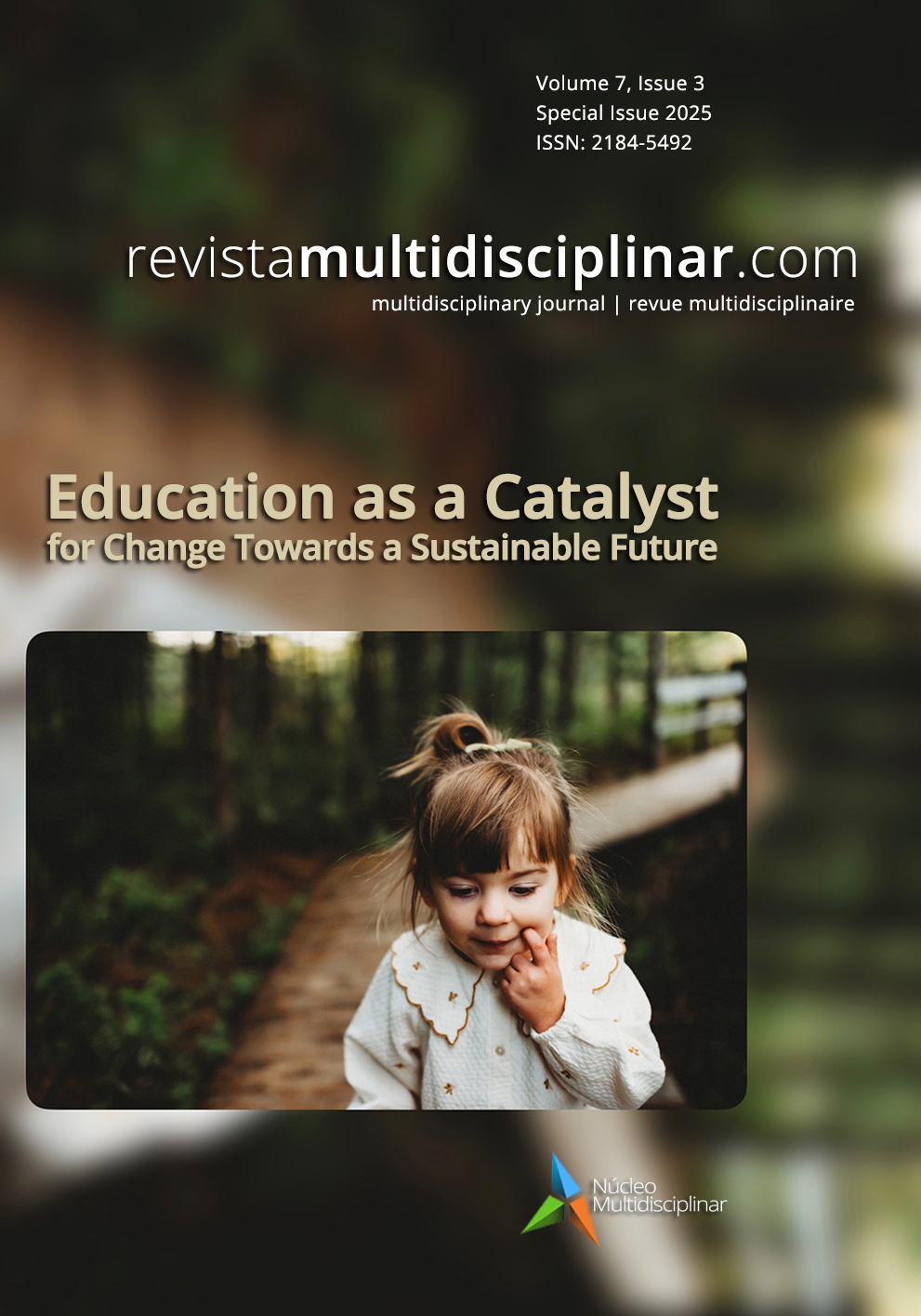Advancing Scientific Literacy in Climate Change Education through Collaborative
Evidence-Based Approaches
DOI:
https://doi.org/10.23882/rmd.25295Palabras clave:
Scientific Literacy, Climate Change Education, Collaborative LearningResumen
Promoting students' scientific literacy in the context of climate change requires effective, evidence-based educational strategies. This paper explores the collaborative efforts among scientists, science educators, schools, and society to enhance understanding of current scientific evidence, innovations, and constructive hope. Since 2010, Finland has implemented a holistic approach to climate change education through the LUMA (STEM) network, engaging students and teachers in formal, nonformal, and informal educational activities. Personalized learning, such as using students' questions as a starting point, and the co-design approach within design-based research, have proven effective in fostering meaningful collaboration and engagement. This paper also introduces a model of scientific literacy tailored to climate change education, emphasizing the importance of integrating novel scientific knowledge, processes, thinking, and the relationship between science, technology, and society at the students’ level through collaborative efforts.
Citas
Aksela, M. (2019). Towards student-centred solutions and pedagogical innovations in science education through co-design approach within design-based research. LUMAT: International Journal on Math, Science and Technology Education, 7(3), 113–139. https://doi.org/10.31129/LUMAT.7.3.421
Aksela, M., Lundell, J., & Ikävalko, T. (Eds.) (2020). LUMA Finland -Together we are more. LUMA Centre Finland. https://www.luma.fi/en/news/2020/12/18/new-online-book-on-national-and-international-luma-science-education-best-solutions-and-models-for-a-good-future/
Aksela, M., & Tolppanen, S. (2022). Towards Student-Centered Climate Change Education Through Co-design Approach in Science Teacher Education. In YS. Hsu, R. Tytler, & P. J. White (Eds.), Innovative Approaches to Socioscientific Issues and Sustainability Education: Linking Research to Practice (pp. 85-99). (Learning Sciences for Higher Education). Springer Singapore. https://doi.org/10.1007/978-981-19-1840-7_6
Davies, P. (1999). What is evidence‐based education? British journal of educational studies, 47(2), 108-121. https://doi.org/10.1111/1467-8527.00106
Haatainen, O., & Aksela, M. (2021). Project-based learning in integrated science education: Active teachers’ perceptions and practices. LUMAT: International Journal on Math, Science and Technology Education, 9(1), 149–173. https://doi.org/10.31129/LUMAT.9.1.1392
Herranen, J., & Aksela, M. (2019). Student-question-based inquiry in science education. Studies in Science Education, 55(1), 1-36. https://doi.org/10.1080/03057267.2019.1658059
Herranen, J., & Aksela, M. (2024). Fostering teachers as sustainability and climate change educators through understanding of teachers' self-efficacy beliefs. LUMAT: International Journal on Math, Science and Technology Education, 12(3), 30-52. https://doi.org/10.31129/LUMAT.12.3.2085
Ikävalko, T., Pernaa, J. Haatainen, O. & Aksela, M., (2024). Promoting institutional collaboration through a joint project-based learning course: a case study of upper secondary school and university students’ experienced relevance. Education Sciences. 13, 7, 17. Education Sciences. https://www.frontiersin.org/journals/education/articles/10.3389/feduc.2024.1347085/full
IPCC. (2023). Summary for Policymakers. In J. Romero & H. Lee (Eds.), Climate Change 2023: Synthesis Report. Contribution of Working Groups I, II and III to the Sixth Assessment Report of the Intergovernmental Panel on Climate Change (pp. 1–34). IPCC.
Markula, A. & Aksela, M. (2022). The key characteristics of project-based learning: how teachers implement projects in K-12 science education. Discip Interdscip Sci Educ Res 4, 2. https://doi.org/10.1186/s43031-021-00042-x
Miller, J. D. (1983). Scientific Literacy: A Conceptual and Empirical Review. Daedalus, 112(2), 29–48. http://www.jstor.org/stable/20024852
Monroe, M. C., Plate, R. R., Oxarart, A., Bowers, A., & Chaves, W. A. (2017). Identifying effective climate change education strategies: a systematic review of the research. Environmental Education Research, 25(6), 791–812. https://doi.org/10.1080/13504622.2017.1360842
Muccione V, Ewen T, Vaghefi SA (2025). A scoping review on climate change education. PLOS Clim 4(1): e0000356. https://doi.org/10.1371/journal.pclm.0000356
Nusche, D., M. Fuster Rabella and S. Lauterbach (2024), “Rethinking education in the context of climate change: Leverage points for transformative change”, OECD Education Working Papers, No. 307, OECD Publishing, Paris, https://doi.org/10.1787/f14c8a81-en.
Ojala, M. (2011). Hope and climate change: the importance of hope for environmental engagement among young people. Environmental Education Research, 18(5), 625–642. https://doi.org/10.1080/13504622.2011.637157
Ratinen I. (2021). Students’ Knowledge of Climate Change, Mitigation and Adaptation in the Context of Constructive Hope. Education Sciences, 11(3), 103. https://doi.org/10.3390/educsci11030103
Reilly, K., Dillon, B., Fahy, F., Phelan, D., Aarnio-Linnanvuori, E., De Vito, L., … McEwen, L. (2024). Learning from young people’s experiences of climate change education. Geography, 109(1), 44–48. https://doi.org/10.1080/00167487.2024.229761
Rousell, D., & Cutter-Mackenzie-Knowles, A. (2019). A systematic review of climate change education: giving children and young people a ‘voice’ and a ‘hand’ in redressing climate change. Children’s Geographies, 18(2), 191–208. https://doi.org/10.1080/00167487.2024.229761
Rushton E, Dunlop L & Atkinson L (2024) Fostering teacher agency in school-based climate change education in England, UK. Curriculum Journal. https://doi.org/10.1002/curj.253
Sihvonen, A. P. E., Herranen, J., Uusi-Äijö, V., & Aksela, M. (2023). Teachers' agency in using students' questions in climate change education. Interdisciplinary Journal of Environmental and Science Education, 19(4), Article e2317. https://www.ijese.com/article/teacher-agency-in-using-students-questions-in-climate-change-education-13724
Taurinen, J., Vesterinen, V. M., Veijonaho, S., Siponen, J., Riuttanen, L., & Ruuskanen, T. (2024). Climate change competencies from perspective of Finnish youth. Journal of Youth Studies, 1–20. https://doi.org/10.1080/13676261.2024.2343724
Tolppanen, S., Aksela, M. (2014). The International Millennium Youth Camp as an Active Learning Ecosystem for Future Scientists. In: Niemi, H., Multisilta, J., Lipponen, L., Vivitsou, M. (eds) Finnish Innovations and Technologies in Schools. SensePublishers. https://doi.org/10.1007/978-94-6209-749-0_12
Tolppanen, S., & Aksela, M.K. (2018). Identifying and addressing students' questions on climate change. The Journal of Environmental Education, 49, 375 - 389. https://doi.org/10.1080/00958964.2017.1417816
Vesterinen, V.-M., Tolppanen, S., & Aksela, M. (2016). Toward citizenship science education: what students do to make the world a better place? International Journal of Science Education, 38(1), 30-50. https://doi.org/10.1080/09500693.2015.1125035
Vuorio E., Pernaa J. & Aksela M. (2024), Lessons for Sustainable Science Education: A Study on Chemists’ Use of Systems Thinking across Ecological, Economic, and Social Domains. Education Sciences. 14(7), 741. https://doi.org/10.3390/educsci14070741
Descargas
Publicado
Cómo citar
Número
Sección
Licencia
Derechos de autor 2025 Maija Aksela

Esta obra está bajo una licencia internacional Creative Commons Atribución-NoComercial 4.0.









